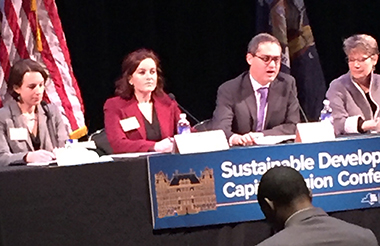Solving Urban Blight
 |
|
CTG Program Director Meghan Cook, second from left, spoke at the Capital Region conference Dec. 6. |
ALBANY, N.Y. (Dec. 13, 2016) -- The University and its Center for Technology in Government (CTG) are quickly becoming go-to resources and advocates on urban blight.
CTG Program Director Meghan Cook and Program Associate Megan Sutherland are invited panel speakers at two of Gov. Andrew Cuomo’s conferences on sustainable development and collaborative governance. These conferences prepare communities to work together on economic development, housing, transportation and environmental preservation.
Cook spoke at the Capital Region conference on Dec. 6, and Sutherland is scheduled to speak at the Mohawk Valley conference in Utica on Dec. 13. They were asked to share the tools and best practices CTG recommends from its continued work with the cities of Schenectady, Troy, Amsterdam and Gloversville to combat urban blight. CTG has been working with the cities since April to build their capacity to share information about property owners, properties, and the practice of code enforcement programs.
These cities, like others throughout the country, face the increasingly persistent and costly problem of blighted and vacant properties. Many experts believe the cycle from blight to demolition can be interrupted by having access to the information needed to identify and track this cycle. Understanding the underlying systemic causes of blight is necessary as well. However, in many cases, the city officials who need the information in order to take action, don’t have access to the most up-to-date, accurate data.
CTG, supported by funding from a New York Department of State Local Efficiency Grant, has spearheaded a project based on the idea that a city’s success in reversing decline relies on having the infrastructure needed to collect, manage and share property and property owner information. That information also needs to be shared with community partners, the public, other cities and the state.
Cook will lead another session at the Smart Cities International Symposium & Exhibition in Chicago in January.
This spring, Cook and Raymond Brescia will teach a UAlbany-Albany Law School course that gives students an opportunity to work with officials in Albany and Schenectady to develop innovative legal, policy, and information management approaches to the challenges of problem properties. The course is Urban Innovation and Creative Problem Solving (PAD 699).
On the creative side, Breathing Lights, led by Associate Professor of Art Adam Frelin and funded by Bloomberg Philanthropies, has taken the state by storm. The month-long art installation illuminated hundreds of vacant buildings throughout the Capital Region to raise awareness of the issue of urban blight and highlight the buildings’ potential for renovation.
![]() For more news, subscribe to UAlbany's RSS headline feeds
For more news, subscribe to UAlbany's RSS headline feeds
A comprehensive public research university, the University at Albany-SUNY offers more than 120 undergraduate majors and minors and 125 master's, doctoral and graduate certificate programs. UAlbany is a leader among all New York State colleges and universities in such diverse fields as atmospheric and environmental sciences, business, education, public health,health sciences, criminal justice, emergency preparedness, engineering and applied sciences, informatics, public administration, social welfare and sociology, taught by an extensive roster of faculty experts. It also offers expanded academic and research opportunities for students through an affiliation with Albany Law School. With a curriculum enhanced by 600 study-abroad opportunities, UAlbany launches great careers.


